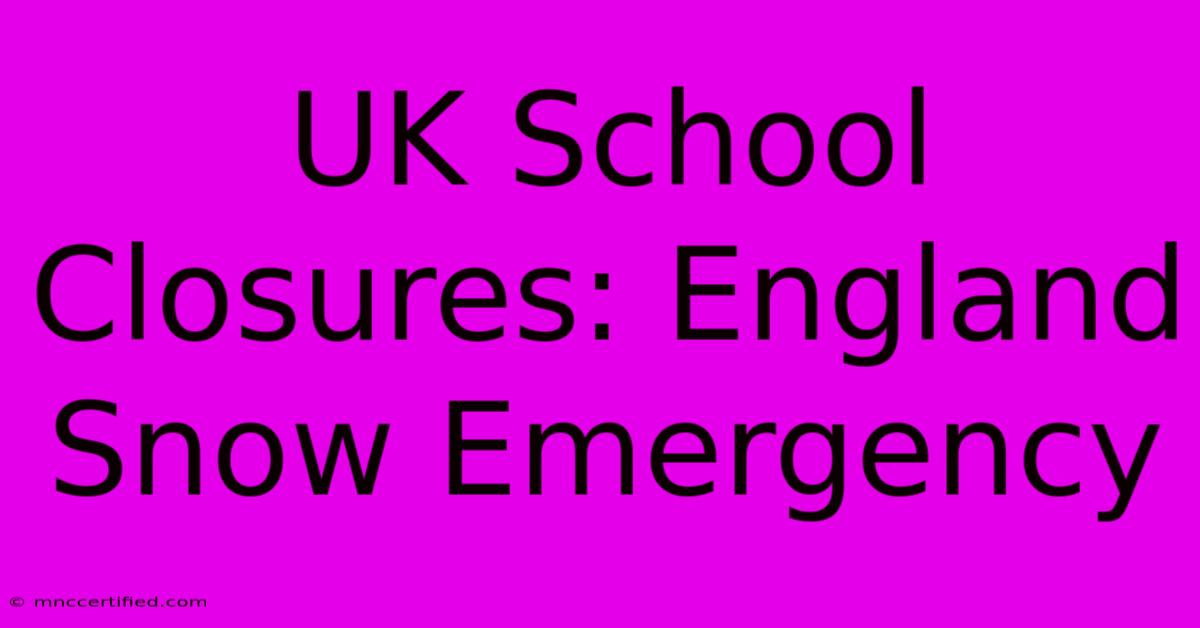UK School Closures: England Snow Emergency

Table of Contents
UK School Closures: England Snow Emergency
The UK, particularly England, has recently experienced significant snowfall, leading to widespread school closures and travel disruptions. This article will explore the impact of this snow emergency on schools, the factors influencing closure decisions, and advice for parents and students.
Understanding School Closure Decisions in Snow Emergencies
School closures in England during severe weather are not taken lightly. Local authorities, in consultation with headteachers and considering factors like travel safety, building accessibility, and staff availability, make these crucial decisions. Several key factors influence whether a school remains open or closes:
1. Travel Conditions: A Primary Concern
The most significant factor is the safety of pupils and staff travelling to and from school. Impassable roads, treacherous pavements, and icy conditions make journeys incredibly hazardous. Local authorities monitor weather forecasts and road conditions closely, using information from the Met Office and Highways England.
2. Building Safety and Accessibility
Even if travel is manageable, schools might close if the building itself presents safety risks. Snow accumulation on roofs, frozen pipes, or power outages can render a school unsafe for occupancy. Regular building inspections are crucial during severe weather events.
3. Staff Attendance and Availability
A sufficient number of teaching and support staff must be present for a school to operate safely and effectively. Severe weather can significantly impact staff attendance, either due to travel difficulties or personal circumstances. Insufficient staffing levels necessitate school closure for the safety and well-being of pupils.
Impact on Students and Parents
School closures caused by severe weather, like the recent snow emergency, significantly disrupt the educational routine. This can lead to:
- Disruption to learning: Missed classes and assignments can impact academic progress, requiring catch-up work.
- Childcare challenges: Parents may face difficulties arranging alternative childcare arrangements at short notice.
- Financial implications: Some parents might face lost income due to the need to stay home and care for their children.
How to Stay Informed About School Closures
Staying updated about school closures is paramount during a snow emergency. Parents should:
- Check the school website: Most schools proactively update their websites with closure information.
- Monitor local news and social media: Local news channels and council social media accounts often broadcast closure announcements.
- Sign up for school alerts: Many schools offer text or email alert systems for immediate notifications.
Preparing for Future Snow Emergencies
Proactive preparation can mitigate the impact of future snow emergencies:
- Emergency kit: Keep a well-stocked emergency kit at home with essential supplies, including food, water, and medications.
- Communication plan: Establish a clear communication plan with family and school to ensure everyone stays informed.
- Alternative childcare arrangements: Identify potential childcare options in advance to ease the burden during unforeseen closures.
Conclusion: Navigating the Snow Emergency
Snow emergencies present significant challenges for schools, parents, and students in the UK. By understanding the factors influencing school closure decisions, staying informed through reliable channels, and preparing proactively, we can minimize disruption and ensure the safety and well-being of everyone during these challenging weather events. Remember to always prioritize safety during severe weather conditions. Staying informed and prepared is key to navigating these unpredictable events effectively. Regularly checking official sources for updated information is crucial for maintaining a clear understanding of the current situation.

Thank you for visiting our website wich cover about UK School Closures: England Snow Emergency. We hope the information provided has been useful to you. Feel free to contact us if you have any questions or need further assistance. See you next time and dont miss to bookmark.
Featured Posts
-
Sinus Surgery Cost With Insurance
Nov 19, 2024
-
Nigeria Rwanda Match Live Updates Score
Nov 19, 2024
-
Insurance Repair Estimate Too Low
Nov 19, 2024
-
Uk Weather Snow And Cold Snap
Nov 19, 2024
-
Croatia 1 1 Portugal Nations League Quarters
Nov 19, 2024